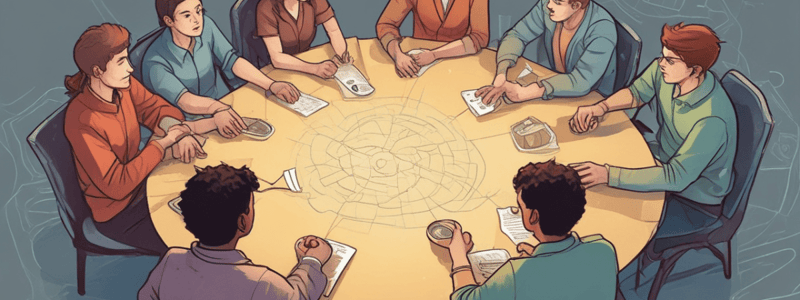Podcast
Questions and Answers
What is the final stage in the group development process according to the text?
What is the final stage in the group development process according to the text?
- Performing
- Norming
- Forming
- Adjourning (correct)
In the context of group formation, what is a common reason for groups to disband?
In the context of group formation, what is a common reason for groups to disband?
- Too much harmony
- Accomplishment of the task (correct)
- Ineffective communication
- Lack of leadership
Which stage is characterized by conflicts over roles and responsibilities within a group?
Which stage is characterized by conflicts over roles and responsibilities within a group?
- Norming
- Storming (correct)
- Performing
- Forming
What feeling is commonly experienced by group members in the adjourning stage?
What feeling is commonly experienced by group members in the adjourning stage?
In which group development stage do members ask, 'What do the others expect me to do?'
In which group development stage do members ask, 'What do the others expect me to do?'
What is the term used to describe the attitudinal and behavioral characteristics of a group?
What is the term used to describe the attitudinal and behavioral characteristics of a group?
Which theory of group formation focuses on the idea that people affiliate due to physical proximity?
Which theory of group formation focuses on the idea that people affiliate due to physical proximity?
What is the main focus of Homans' Interaction Theory?
What is the main focus of Homans' Interaction Theory?
Which of the following is NOT one of the theories of group formation mentioned?
Which of the following is NOT one of the theories of group formation mentioned?
In the context of groups, what does 'group synergy' refer to?
In the context of groups, what does 'group synergy' refer to?
In which stage of group development does the group attain a feeling of cohesiveness, loyalty, and trust?
In which stage of group development does the group attain a feeling of cohesiveness, loyalty, and trust?
What type of skills do students learn in the Interpersonal and Small Group Social Skills stage?
What type of skills do students learn in the Interpersonal and Small Group Social Skills stage?
What is the purpose of Group Processing (Synergy) in group dynamics?
What is the purpose of Group Processing (Synergy) in group dynamics?
What distinguishes Stage 4 Performing in group development from other stages?
What distinguishes Stage 4 Performing in group development from other stages?
What marks the achievement of Stage 4 Performing according to the text?
What marks the achievement of Stage 4 Performing according to the text?
During the Forming stage of group development, what drives individual behavior?
During the Forming stage of group development, what drives individual behavior?
What is a characteristic of the Storming stage in group development?
What is a characteristic of the Storming stage in group development?
In the group formation process, what is the purpose of the Norming stage?
In the group formation process, what is the purpose of the Norming stage?
What is a key aspect of the Performing stage in group development?
What is a key aspect of the Performing stage in group development?
Why is it important not to rush through the Forming stage of group development?
Why is it important not to rush through the Forming stage of group development?
What is the essence of individual accountability in cooperative learning, according to the text?
What is the essence of individual accountability in cooperative learning, according to the text?
Which element differentiates cooperative learning from simply putting students into groups according to the text?
Which element differentiates cooperative learning from simply putting students into groups according to the text?
What is a crucial aspect of positive interdependence in cooperative learning, as explained in the text?
What is a crucial aspect of positive interdependence in cooperative learning, as explained in the text?
In cooperative learning, what dynamic is essential for important cognitive activities and interpersonal interactions, as mentioned in the text?
In cooperative learning, what dynamic is essential for important cognitive activities and interpersonal interactions, as mentioned in the text?
What is a key aspect that group members must be prepared to do in order to reach a stage of understanding and appreciation, as described in the text?
What is a key aspect that group members must be prepared to do in order to reach a stage of understanding and appreciation, as described in the text?
What is the term for a situation where group members want to be seen agreeing with a leader and therefore hold back from expressing their opinions?
What is the term for a situation where group members want to be seen agreeing with a leader and therefore hold back from expressing their opinions?
In group dynamics, what behavior occurs when a more dominant member takes charge due to weak leadership?
In group dynamics, what behavior occurs when a more dominant member takes charge due to weak leadership?
What negative group dynamic behavior disrupts the flow of information in a group?
What negative group dynamic behavior disrupts the flow of information in a group?
Which behavior occurs when individuals place a desire for consensus above making the right decision?
Which behavior occurs when individuals place a desire for consensus above making the right decision?
What is the term for a situation where group members leave their colleagues to do all the work?
What is the term for a situation where group members leave their colleagues to do all the work?
In group dynamics, what occurs when team members perceive they are being excessively judged by others and hold back their opinions?
In group dynamics, what occurs when team members perceive they are being excessively judged by others and hold back their opinions?
Which negative group dynamic behavior can lead to a lack of direction, power struggles, or a focus on wrong priorities?
Which negative group dynamic behavior can lead to a lack of direction, power struggles, or a focus on wrong priorities?
What kind of behavior occurs when some group members take it easy and limit their contributions during group work?
What kind of behavior occurs when some group members take it easy and limit their contributions during group work?
What type of individual tends to dominate conversations in a group setting?
What type of individual tends to dominate conversations in a group setting?
Which negative behavior within a group happens when individuals disrupt the flow of information?
Which negative behavior within a group happens when individuals disrupt the flow of information?
What characterizes the stage of group development where members vie for the leadership position?
What characterizes the stage of group development where members vie for the leadership position?
Which of the following is a common challenge faced by groups in the stage characterized by struggling for power?
Which of the following is a common challenge faced by groups in the stage characterized by struggling for power?
What is the primary focus of the Norming stage of group development?
What is the primary focus of the Norming stage of group development?
What is a critical outcome of the Norming stage of group development?
What is a critical outcome of the Norming stage of group development?
Why might a group disband or remain ineffective in advancing beyond a certain stage of development?
Why might a group disband or remain ineffective in advancing beyond a certain stage of development?
Flashcards are hidden until you start studying
Study Notes
Group Development Stages
- There are five stages of group development: Forming, Storming, Norming, Performing, and Adjourning.
- Not all groups experience all stages, especially Adjourning, which is characterized by the disbandment of the group.
Forming Stage
- The group comes together and begins the process of getting to know one another.
- Members tend to be polite and try to figure out their role in the group.
- Individual behavior is driven by a desire to be accepted and avoid controversy or conflict.
- The major goals of the group have not been established, and the nature of the task or leadership has not been determined.
- This stage is characterized by confusion and uncertainty.
Storming Stage
- The group is likely to experience the highest level of disagreement and conflict.
- Leadership may be questioned, and group members' ideas may be challenged.
- Members often vie for the leadership position and struggle for power.
- This stage can be a positive experience if members can achieve cohesiveness through resolution.
Norming Stage
- The group starts to come together to formulate a single plan for the common goal.
- Members recognize individual differences and shared expectations.
- Cooperative effort or learning should begin to yield results.
- Responsibilities are divided among members, and the group decides how it will evaluate progress.
- "Rules of engagement" for the group become established, and the scope of the group's tasks or responsibilities are clear and agreed.
Performing Stage
- The group has matured and attains a feeling of cohesiveness (loyalty, trust).
- Characterized by a state of interdependence and flexibility.
- Individuals accept each other, and conflict is resolved through group discussion.
- Members make decisions through a rational process focused on relevant goals rather than emotional issues.
- The group is able to work together to accomplish the goal with little need for outside supervision or input.
Adjourning Stage
- The dissolution of the group and the opportunity to reflect on successful or unsuccessful outcomes.
- Members often experience feelings of closure and sadness as they prepare to leave.
- Described by some authors as "deforming and mourning" due to the sense of loss felt by group members.
Group Dynamics
- The attitudinal and behavioral characteristics of a group.
- Concerns how groups are formed, their structure and process, and how they function.
- Interactions can be both positive and negative and affect the performance of the team.
Theories of Group Formation
- There are four main theories: Propinquity Theory, Balance Theory, Homans' Interaction Theory, and Exchange Theory.
- Propinquity Theory: The most basic theory explaining affiliation is propinquity.
Negative Group Dynamics
- Poor group dynamics can damage morale, undermine productivity, and lead to bad decisions or unsuccessful outcomes.
- Examples of negative group dynamics include:
- Weak leadership
- Excessive deference to authority
- Blocking
- Groupthink
- Free riding
- Evaluation apprehension
Group Roles
- The Dominator: This person will dominate the conversation in a group, talking about almost anything.
Cooperative Learning
- Five key elements (PIES) differentiate cooperative learning from simply putting students into groups to learn:
- Positive Interdependence
- Individual Accountability
- Face-to-Face (Promotive) Interaction
- Interpersonal and Small Group Social Skills
- Group Processing (Synergy)
Studying That Suits You
Use AI to generate personalized quizzes and flashcards to suit your learning preferences.




